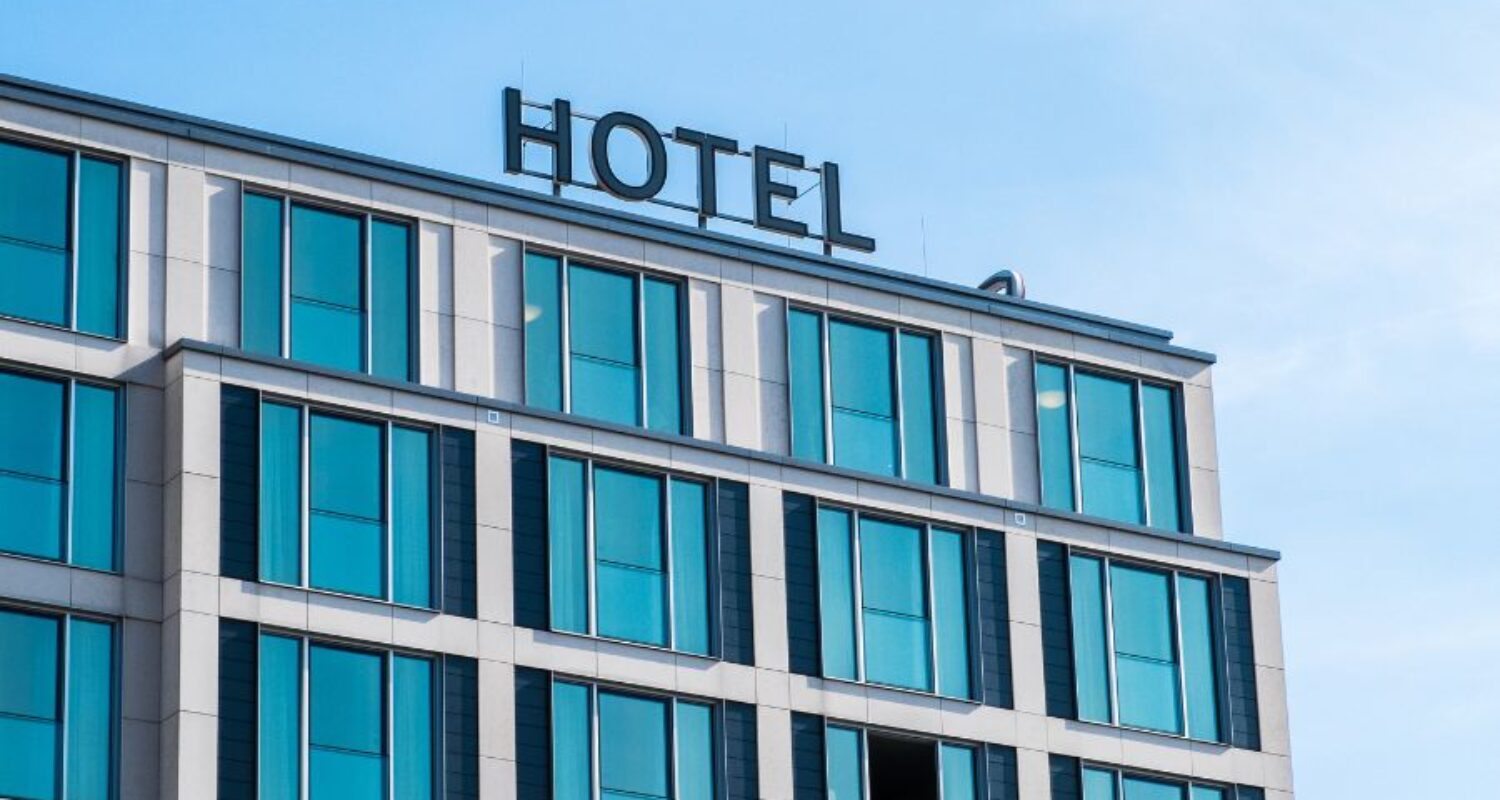In Australia’s competitive hospitality market, building a strong hotel brand is key. It’s like making good friends – your brand should be engaging, consistent, authentic, and exciting. But how do you create a memorable hotel brand?
This article will explore the best ways to build a successful hotel brand. We’ll talk about defining your brand’s core values and creating a unique visual identity. You’ll learn how to make a hotel brand that impresses every guest.
Key Takeaways:
- Understand the importance of hotel branding in today’s competitive market
- Discover the essential elements of a strong hotel brand identity
- Learn effective strategies for developing a unique and authentic hotel brand
- Explore examples of successful hotel brands and their branding tactics
- Gain insights into how to assess your current brand position and identify areas for improvement

What is Hotel Branding?
Hotel branding creates a quick connection with travelers when they see your hotel’s name. It shapes how people see and experience your hotel. This includes your hotel’s look, design, and services.
Good hotel branding makes guests remember your image and logo easily. They quickly know what to expect from your hotel. Your brand tells them a lot, so they don’t have to do a lot of research. For instance, will your hotel be cozy and quiet, or lively and social?
The Importance of Hotel Brand Identity
Your hotel’s brand identity is key to your branding. It’s what makes your hotel stand out. This includes your name, logo, colors, fonts, and design style. A strong identity lets travelers quickly know what your hotel is about.
Shaping Brand Perception and Experience
Hotel branding also shapes the guest experience to match your brand. This means the service, amenities, and atmosphere you offer. By keeping your brand promise, you build a strong reputation with travelers.
| Novotel Beijing | Kimpton Hotels | The Peninsula Beijing |
|---|---|---|
| Differentiated itself through storytelling, focusing on family dynamics and business services, showcasing the importance of brand narrative in hotel branding strategies. | Innovative approach to customer loyalty, creating a unique brand relationship platform with its Kimpton Karma Rewards program. | Exemplifies excellent hospitality by anticipating guests’ needs and emphasizing cultural care, showcasing the significance of guest-centric service in brand building. |
Understanding hotel branding helps you create a unique and memorable identity. This identity will attract your target audience and make your hotel stand out in a crowded market.
Tips for Branding Your Hotel
Building a strong hotel brand is key, whether starting fresh or rebranding. Hoteliers in Australia must think about location, culture, competitors, and target audience. We need to offer value and originality to stand out.
Online channels are crucial for hotel branding. 75% of travelers start their search for hotels on a search engine. Investing in SEO for our websites is vital. Tools like Google Analytics help us understand user behavior and drive bookings.
Creating a memorable hotel brand mixes strategy, creativity, and insight. The marketing mix for hotels involves rates by day of the week, market segments, seasonality, room types, and competition perception. We must consider these when building our brand identity.
Offline campaigns like guerilla marketing and influencer partnerships boost brand awareness and bookings. Storytelling that touches customers emotionally can create a strong connection to our brand. This can lead to more bookings.
Successful hotel branding in Australia is about knowing our unique value. We must tailor our offerings to our audience and deliver a memorable experience. This sets us apart from competitors.
Crucial Elements for Establishing Brand Identity
Creating a memorable hotel brand is more than just a catchy name and logo. It’s about a mix of core philosophy, visual identity, storytelling, and offerings. These elements work together to shape how people see and experience your hotel. They help guests feel a connection and know your brand well.
Distinctive Name and Logo
A good hotel brand starts with a unique name and logo. These should match your brand values and appeal to your audience. Small Biz Optimize can help create a name and logo that make your hotel stand out.
Unwavering Brand Philosophy
Your hotel’s brand identity is rooted in its core philosophy. This includes values, mission, and principles that guide your brand. It should be clear and shown in every part of your hotel, from guest experience to marketing. A strong philosophy helps connect with your audience on an emotional level.
Cohesive Visual Identity
A strong visual identity is key for a recognizable hotel brand. It includes your logo, colors, typography, images, and overall look. When these elements match, they create a striking and consistent brand presence everywhere, from your website to your property.
Compelling Brand Storytelling
Brand storytelling is a powerful way to shape guest experiences. By sharing your hotel’s unique story and history, you build a deeper connection and loyalty. Your story should be in your marketing, guest communications, and overall experience.
Tailored Hotel Offerings
Your hotel’s offerings and services are the last piece of your brand identity. They should match your brand philosophy and meet the promises you make to guests. Unique amenities and experiences make your hotel stand out and reinforce its value.
By focusing on these key elements, you can create a memorable and unique hotel brand. This brand will resonate with your audience and stand out in the market.
Importance of Brand Development
Creating a strong brand is vital for your hotel’s success in Australia. It helps set clear expectations and promises a consistent guest experience. It also builds trust, motivates staff, and creates a loyal customer base. Making your guests feel like family is key to hotel guest loyalty.
Studies show that people prefer brands they trust over those without a strong identity. This is especially true in the hospitality sector. Brand loyalty is crucial here, as it can make or break guest approval.
Good hotel brand strategies lead to more guests coming back. This builds trust and encourages people to talk about your hotel. Emotions drive most purchase decisions, so creating an emotive brand is essential.
Being consistent in branding is crucial. Your brand image should be seen in everything from your name and logo to social media. This shows excellence and consistency to your customers. Social media is also key for promoting your hotel and creating excitement among travelers.
Investing in hotel brand development can boost your profits. A strong brand attracts more guests and builds deeper loyalty. Effective branding can make your hotel stand out, leading to more revenue.
Hotel Branding Strategies and Ideas
In the competitive hotel industry, over 700,000 hotels and resorts exist worldwide. Creating a memorable brand is key. By defining a niche and mission, hotels can target guests effectively. Analyzing competition helps, focus on purpose, target audience, and service quality.
Hotels can stand out with various branding strategies. Sensory branding, like pleasant smells, improves the guest experience. 91% of guests find this essential. Also, customer loyalty programs are vital, as they help brands grow revenue faster.
Crafting an authentic hotel brand is crucial. Define your brand’s values and reflect them in your design and guest experience. A strong online presence, especially on social media, is also key. 9 out of 10 people use the Internet for trip planning, including hotel bookings.
| Branding Strategy | Successful Example | Key Takeaway |
|---|---|---|
| Storytelling | Marriott International’s “Golden Rule” campaign | Highlighting exceptional hospitality and acts of kindness fosters emotional connections with guests. |
| Positioning for Luxury | The Ritz-Carlton | Iconic branding elements and personalized guest experiences convey a sense of opulent exclusivity. |
| Appealing to Niche Audiences | Ace Hotel | Embracing a hip, urban vibe and supporting local artisans resonates with creative, free-spirited travelers. |
| Enhancing Digital Experience | Hilton’s Hilton Honors app | Mobile-friendly features like check-in, personalized recommendations, and seamless booking improve the guest experience. |
Well-crafted hotel branding strategies can help businesses stand out. They create an emotional connection with guests. This leads to more bookings and revenue.
Assessing Your Brand Position
Building a unique brand for your hotel starts with understanding your current identity. You need to research your competitors and see what makes your hotel special. This way, you can create a brand that truly represents your hotel and attracts the right guests.
Evaluating Your Hotel Brand Identity
First, examine your hotel’s brand closely. Ask yourself these questions:
- What are the core elements of your hotel’s brand, including your name, logo, and visual identity?
- How does your brand positioning compare to that of your competitors in the hotel industry?
- What unique value proposition does your hotel offer that sets it apart from others?
By doing a hotel brand assessment, you learn about your brand’s strengths and weaknesses. This helps you find ways to differentiate your hotel brand and stand out in the market.
Analyzing Your Hotel Competitors
Doing a hotel competitor analysis is key to hotel brand positioning. Look at your competitors’ brands, marketing, and customer experiences. This shows you how to make your hotel unique and appealing to your target audience.
| Hotel Brand | Brand Positioning | Unique Selling Points |
|---|---|---|
| Hilton | Upscale, global hotel chain | Consistent service, wide range of amenities, loyalty program |
| Airbnb | Unique, local accommodations | Authentic experiences, personalized service, cost-effective |
| Your Hotel | Boutique, eco-friendly hotel | Sustainable practices, personalized guest experiences, local community engagement |
Knowing your competitors’ hotel brand positioning and unique selling points helps you create a unique brand. This brand will resonate with your target audience.
“Successful hotel branding can contribute to generating new revenue channels by attracting target audiences and converting leads into loyal guests.”
With insights from your brand assessment and competitor analysis, you can now develop a hotel brand differentiation strategy. This strategy will make your hotel stand out and leave a lasting impression on your guests.

Rethinking Your Logo and Colors
Exploring hotel branding, your logo and colors are key. They shape your brand and connect with guests. This is crucial for your hotel’s identity.
Start by thinking about your brand values and guest experience. Colors can evoke feelings and set your hotel’s mood. For example, calm and serene colors fit a spa-like hotel, while vibrant and energetic hues attract younger guests.
Creating a logo and color scheme that truly represents your hotel is the goal. A good logo becomes a symbol of your brand. A consistent color palette makes your hotel look unified everywhere, from your website to your lobby.
Remember, consistency is key in hotel branding. Using your logo, colors, and visual identity everywhere builds trust and loyalty. It makes your guests feel at home.
| Hotel Brand | Primary Colors | Significance |
|---|---|---|
| Capella | Blue, Gold | Sophistication, Luxury |
| Kempinski | Blue, Gold | Elegance, Prestige |
| Jumeirah | Blue, Gold | Opulence, Grandeur |
| Conrad | Blue, Silver | Refinement, Modernity |
| Viceroy | Blue, Gold | Timeless Luxury |
By designing a striking logo and color palette, you make your hotel stand out. It will attract your target audience and leave a lasting impression.
Being Authentic
Hotel brands are trying to stand out in a busy market. One key thing that can really connect with guests is being real. Successful brands see their customers as people, not just guests. They show genuine and relatable traits, not just what they need.
Creating a real hotel brand is more than a cool logo. It’s about being down-to-earth and speaking directly to your audience. You need a brand personality that matches what your guests want.
Telling your brand’s story is key to connecting with guests. Share your hotel’s history, values, and purpose. This builds trust and loyalty, making your brand more than just a place to stay.
“Sense of place contributes to providing a unique atmosphere and brand recognition. Examples include iconic elements like Chinese lions at The Peninsula hotels, high-quality residential feel at Rosewood, and blue and gold colors at Ritz Paris.”
Being authentic can make your hotel stand out. Travelers want unique, local experiences. Showcasing your heritage and culture can make your hotel special. This way, you can create a lasting bond with your guests.
Defining Your Visual Identity
A great hotel brand starts with a well-thought-out visual identity. It’s not just about your hotel brand design and colors. Your website, social media, emails, and marketing materials all play a part. They should all work together to give your guests a memorable experience.
To create strong hotel brand visuals, first decide on your brand’s look and feel. Think about the mood, tone, and personality you want to show. Do you want to be sleek and modern or warm and rustic? Knowing this will help you design your hotel website design and hotel social media branding.
- Make a brand guidelines document that shows how to use your logo, colors, fonts, and images.
- Keep your visual identity the same everywhere, from your website to social media and emails.
- Use great photos and illustrations to tell your hotel’s story and show what makes it special.
- Keep up with new design trends to make sure your look stays fresh and interesting.
“A cohesive visual identity is the foundation for a truly memorable hotel brand. It’s what captivates guests, strengthens their connection, and keeps them coming back.”
By carefully defining and consistently using your hotel’s visual identity, you’ll make a lasting impression. This will attract your target audience and help you stand out in the competitive hospitality world.
Understanding Your Philosophy
At the heart of any successful hotel brand are clear values and principles. These define what the brand stands for and believes in. Whether it’s a focus on sustainability, luxury, or exceptional guest experiences, these core hotel brand values must be well-defined and consistently applied.
Creating a strong hotel brand philosophy is key. It guides your design choices, guest interactions, and brand messaging. By ensuring your hotel brand consistency reflects your core values, you build a memorable brand that connects with your audience.
Defining Your Brand Values
Begin by identifying your hotel’s core values. These might include:
- Commitment to sustainability
- Dedication to personalized hotel guest experience
- Emphasis on luxury and opulence
- Focus on innovation and technology
- Fostering a sense of community and belonging
After defining your brand’s core values, it’s crucial to ensure they’re reflected in every part of your hotel. This includes the lobby design and staff interactions. A holistic approach to hotel brand philosophy creates a powerful and authentic brand identity that guests will remember.
“The greatest brands are built on powerful ideas and strong values that are consistently expressed across all touchpoints.” – Branding expert, Jane Doe
By aligning your hotel brand values, design, and guest experience, you create a cohesive brand. This sets you apart in a competitive market. Your commitment to authenticity and detail will boost guest loyalty and strengthen your brand reputation.
Conclusion
In Australia’s competitive hotel market, creating a strong brand is key. It helps attract and keep guests. By making your hotel look and feel unique, you can stand out. This article offers tips to make your hotel brand memorable and successful.
Good hotel branding is more than a pretty logo or slogan. It’s about creating a complete experience that shows what your hotel is all about. This includes personalized service, unique amenities, and a consistent look and feel. Every part of your brand should work together to give guests a memorable stay.
To succeed in the changing hospitality world, use smart marketing strategies. This includes SEO, content marketing, and social media. By focusing on branding and marketing, your hotel can become a top choice for travelers in Australia.
FAQ
What is hotel branding?
Hotel branding makes travelers feel connected to your hotel when they see your name. It shapes how people see and experience your hotel through different elements.
What are the crucial elements for establishing a hotel’s brand identity?
Key elements include a unique name and logo, a guiding philosophy, and a strong visual identity. You also need compelling stories and clear services that match your brand promises.
Why is brand development important for the long-term success of a hotel business?
A strong brand sets clear expectations and delivers a consistent guest experience. It builds awareness, trust, and loyalty. It also motivates staff and sets your hotel apart.
What are some key strategies for earning recognition for a hotel brand?
To earn recognition, develop a solid marketing strategy and spend wisely. Keep an eye on competitors and find unique ways to stand out. Stay true to your brand and empower your staff. Make sure your website is mobile-friendly and optimize your online listings. Use social media to share your story.
How should a hotel brand evaluate and analyze its current identity?
To evaluate your hotel’s identity, research competitors and understand their messaging. Identify what makes your hotel unique. Use this to create a brand identity that truly represents your hotel and appeals to your target audience.
What should hotels consider when creating their logo and color scheme?
When creating a logo and color scheme, revisit your core values and brand messages. Choose colors that reflect your hotel’s mood and identity. The goal is to create a logo and color palette that truly represents your brand.
Why is it important for hotel brands to be authentic?
Successful hotel brands connect with guests on an emotional level. They show genuine and relatable characteristics. Creating an authentic brand story is key to building a strong connection with potential guests.
What is the foundation of a successful hotel brand?
A successful hotel brand is built on clear values and principles. These values guide the brand strategy, from design and logo to guest experience and messaging. They determine what the brand stands for and believes in.




